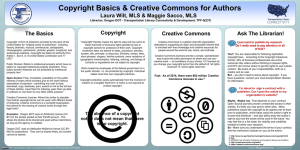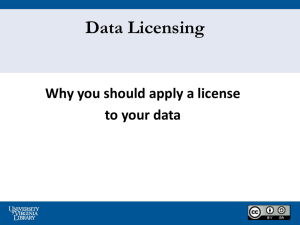Beyond Access: Enabling Reuse of Research Andrew Johnson UCCS Copyright Conference
advertisement
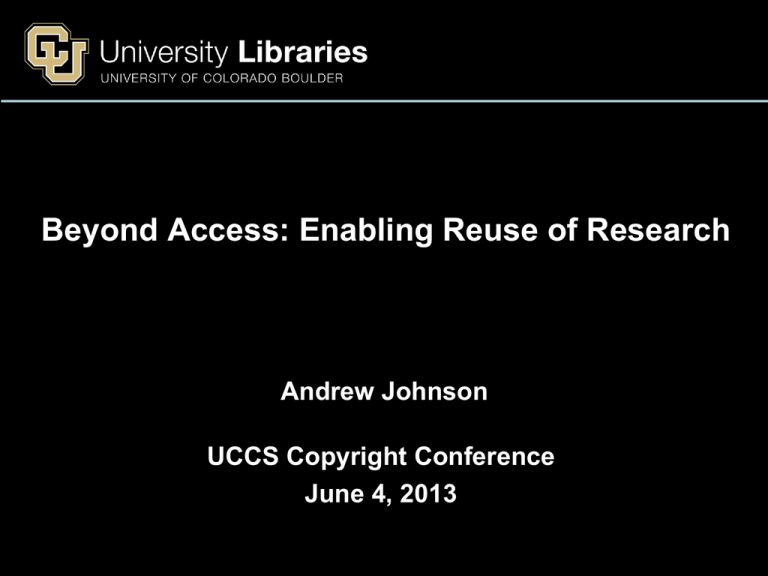
Beyond Access: Enabling Reuse of Research Andrew Johnson UCCS Copyright Conference June 4, 2013 Who am I? • Not a lawyer • Not a copyright wonk • Someone interested in: • Improving research processes • Innovation • Openness • Justice Open Access Definition “By ‘open access’ to this [scholarly] literature, we mean its free availability on the public internet, permitting any users to read, download, copy, distribute, print, search, or link to the full texts of these articles, crawl them for indexing, pass them as data to software, or use them for any other lawful purpose, without financial, legal, or technical barriers other than those inseparable from gaining access to the internet itself.” Budapest Open Access Initiative (2002) Source: http://www.budapestopenaccessinitiative.org/read Degrees of Open Access • Gratis (“free as in beer”) –No cost for readers to access the scholarly literature –BOAI: “free availability on the public internet” • Libre (“free as in speech”) –Not only free of costs but also free of many use restrictions –BOAI: “permitting any users to read, download, copy, distribute, print, search, or link to the full texts of these articles, crawl them for indexing, pass them as data to software, or use them for any other lawful purpose” Roads to Open Access • Green OA –Self-archiving versions of published articles in institutional repositories and/or central repositories –No cost to authors –Publisher agreements may limit/restrict this practice • Gold OA –Publishing articles in Open Access journals –Various publishing models, many require authors (or their institutions) to pay submission/publication fees Open Access and Copyright • Gratis (“free as in beer”) –Primarily a business model issue for Gold OA –Copyright central to Green OA (author/university v. publisher as rightsholder) • Libre (“free as in speech”) –Copyright (licensing) is the mechanism for enabling this type of reuse –Creative Commons licenses are widely used for this purpose Creative Commons Licenses "...give everyone from individual creators to large companies and institutions a simple, standardized way to grant copyright permissions to their creative work. The combination of our tools and our users is a vast and growing digital commons, a pool of content that can be copied, distributed, edited, remixed, and built upon, all within the boundaries of copyright law." Source: http://creativecommons.org/licenses/ Types of Creative Commons Licenses Attribution (CC BY) Attribution-ShareAlike (CC BY-SA) Attribution-NoDerivs (CC BY-ND) Attribution-NonCommercial (CC BY-NC) Attribution-NonCommercial-ShareAlike (CC BY-NC-SA) Attribution-NonCommercial-NoDerivs (CC BY-NC-ND) Source: http://creativecommons.org/licenses/ Creative Commons Public Domain Tools • CC0 - Tool for waiving copyright or database rights to your own works • Public Domain Mark - Tool for labeling copyright-free works (not necessarily your own) Source: http://creativecommons.org/publicdomain/ Recent OA Legislation & Funder Mandates • White House Memo on Public Access to Research -Silent on reuse licenses/terms for publications or data • Fair Access to Science and Technology Research Act -Publications should be made available “in formats and under terms that enable productive reuse, including computational analysis by state-of-the-art technologies” • Research Councils UK Policy on Open Access -Specifies CC-BY for publications OA Debate Shifts to Implementation "...publishers understand that OA mandates are here to stay. They might quibble about embargoes, might insist on their right to demand copyright, might insist that links to their own Web sites, rather than deposit into a central federal repository (such as PMC), is the way to go, but at the end of the day, to a person, they stood up and said they supported making research available—after some time, under some restraints. That was absolutely not the conversation any of us were having five years ago, when the NIH policy was put into place." Rebecca Kennison, Director, Center for Digital Research and Scholarship at Columbia University Source:http://newsbreaks.infotoday.com/NewsBreaks/Dialogue-over-Public-Access-to-ScholarlyPublications-Continues-in-the-US-89803.asp Key Copyright Questions for OA Implementation • Who should hold copyright over research publications and data? • Which licenses should be used for research publications and data? • How can copyright/licensing be used to enhance research, promote innovation, and accelerate scientific breakthrough? SPARC Recommendations for Article Rights Authors ● Retain the rights you want ● Use and develop your own work without restriction ● Increase access for education and research ● Receive proper attribution when your work is used ● If you choose, deposit your work in an open online archive where it will be permanently and openly accessible Publishers ● Obtain a non-exclusive right to publish and distribute a work and receive a financial return ● Receive proper attribution and citation as journal of first publication ● Migrate the work to future formats and include it in collections "If you give away control in the copyright agreement, you may limit [an article's] use" Source: http://www.sparc.arl.org/sparc/author/addendum.shtml Support for CC BY BOAI: “...permitting any users to read, download, copy, distribute, print, search, or link to the full texts of these articles, crawl them for indexing, pass them as data to software, or use them for any other lawful purpose.” SPARC: "We need both barrier-free access to and full digital re-use of the full text of digital articles." Source: http://www.sparc.arl.org/bm~doc/sparc-nas-comments.pdf Klaus Graf: "No researcher needs an incentive (such as that provided in copyright law) to do research or to publish his results. Copyright, with its restrictions, simply isn’t an appropriate instrument in this sector. ...All research results should be made CC BY (and all data CC 0)." Source: http://jlsc-pub.org/jlsc/vol1/iss1/5/ OASPA: "Given the ways in which additional restrictions can limit the reach and impact of research outputs, OASPA therefore strongly encourages the use of the CC-BY license, rather than one of the more restrictive licenses or indeed a license that is ‘functionally equivalent’ to CC-BY." Source: http://oaspa.org/why-cc-by/ What about data? • Unlike publications, facts and data are not copyrightable in the US (see http://www.lib.umich.edu/copyright/facts-and-data) • Even so, many data sets are made available under a variety of terms and conditions • Integration of data from diverse disciplines and sources is key to many areas of research • Making sure terms for various data sets align is time-consuming and difficult to automate • Even minimal terms like attribution (e.g., CC BY) can create difficulties when data is compiled from a large number of sources • Science Commons and others (e.g., Dryad) recommend CC0 for data Text/Data/Content Mining • Definition: Using machines to analyze electronic texts for a variety of purposes (e.g., lexical analysis to determine word frequencies in a corpus) • These techniques are increasingly necessary to utilize the vast and growing amount of literature in many disciplines (and sub-disciplines) • Even when access to full-text articles is provided, licenses or other terms of use may prevent text mining • At least some (and probably most) publisher agreements don't allow text mining of content (see Heather Piwowar's negotiations with Elsevier: http://researchremix.wordpress.com/2012/04/17/elsevier-agrees/) Support for "mining rights" "Policies must ensure that appropriate rights are assigned to enable full reuse -including text/data mining and computational analysis. We don't want to end up in a siloed, 'read-only' world." Heather Joseph, Executive Director of SPARC Source: http://www.sparc.arl.org/bm~doc/sparc-nas-comments.pdf "The right to read must be the right to mine." Peter Murray-Rust, Chemist, University of Cambridge Source:http://blogs.ch.cam.ac.uk/pmr/2013/05/29/licences4europe-has-notaccepted-the-right-to-read-is-the-right-to-mine/ What is to be done? ● ● ● ● Advocate for less restrictive licenses/terms for freely available (and even not freely available) publications and data Educate about the need for machine-readable licenses and how to apply these to works Promote publishing in journals that do not require transfer of copyright and make articles available under CC BY or similar terms Encourage deposit of data in repositories that use CC0 or equivalent terms (unless there are legal or ethical concerns preventing this) Why? Librarians' expertise helps researchers understand copyright issues enabling greater access to and reuse of research publications and data New forms of scholarly communication and research present opportunities for academic librarians Greater access to and reuse of publications and data allows new forms of scholarly communication and research to be developed Thank you! Copyright 2013 by Andrew Johnson This work is licensed under a Creative Commons Attribution 3.0 Unported License
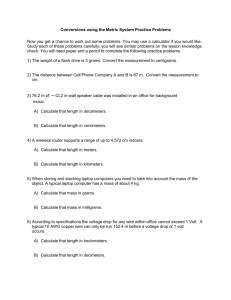
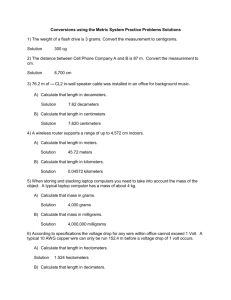
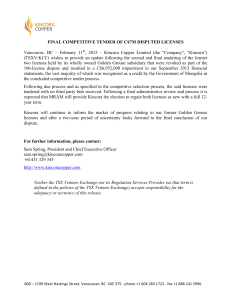
![Copyleft Presentation [English]](http://s2.studylib.net/store/data/005422621_1-22fca5bcd233f6088a57b404dac969db-300x300.png)
